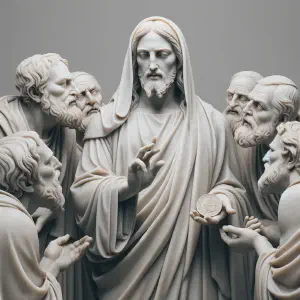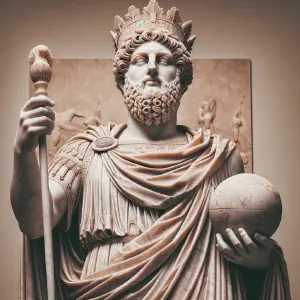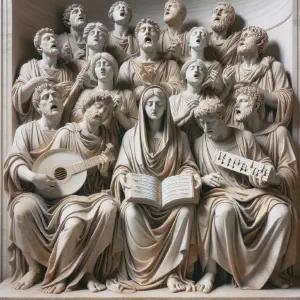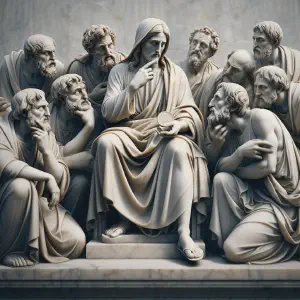The Divine Symphony of Faith



In a contrasting scene, the Pharisees, stewards of the law, plotted to ensnare Jesus with cunning questions. Their deceit, however, was transparent to Him. In a masterful response to their query about the census tax, Jesus revealed their hypocrisy and showcased His wisdom. By asking them to examine the coin used for the tax, He drew a line between worldly obligations and divine allegiance. His answer, “Repay to Caesar what belongs to Caesar and to God what belongs to God,” resonated as a profound truth, emphasizing the balance between earthly duties and heavenly devotion, a principle that would guide generations to come.
Five Questions
What is the significance of Cyrus being called by God in Isaiah 45, despite not knowing Him?
Cyrus’s role demonstrates God’s sovereignty and His ability to use anyone to fulfill His divine plans. It highlights that God’s actions and choices transcend human understanding. Even though Cyrus was unaware of God, he was chosen to play a crucial role in Israel’s history, showing that God’s purposes are not limited to those who know Him.
How does Psalm 96 relate to the theme of God’s sovereignty shown in the Isaiah reading?
Psalm 96 calls all nations to recognize and worship the true God, acknowledging His glory and might. This aligns with the theme in Isaiah, where God demonstrates His power through Cyrus. Both passages emphasize God’s supremacy over all the earth and the need for all people, not just Israel, to acknowledge His sovereignty.
What does the letter to the Thessalonians teach us about living out our faith?
In his letter to the Thessalonians, Paul praises their work of faith, labor of love, and endurance in hope. It teaches us that faith is not just a belief but an active, living experience. It’s about turning our faith into tangible actions of love and maintaining hope in Jesus Christ, even amidst challenges.
How does Jesus’ response to the Pharisees’ question about paying taxes reflect His wisdom?
Jesus’ response, “Repay to Caesar what belongs to Caesar and to God what belongs to God,” showcases His ability to navigate tricky situations wisely. He doesn’t just avoid the trap set by the Pharisees but also teaches an important lesson about the distinction between civic responsibilities and spiritual obligations, highlighting the importance of discernment in our lives.
What overarching message do these scriptures convey for a Christian’s daily life?
These scriptures collectively convey that acknowledging God’s sovereignty, actively living out our faith with love and hope, and wisely balancing our earthly duties with our spiritual devotion are essential for a Christian’s life. They remind us that our actions and decisions, both in daily life and in our spiritual journey, should reflect our understanding of God’s supremacy and our commitment to His teachings.
Bible Study
Isaiah 45:1, 4-6
Thus says the LORD to his anointed, Cyrus,
whose right hand I grasp,
subduing nations before him,
and making kings run in his service,
opening doors before him
and leaving the gates unbarred:
For the sake of Jacob, my servant,
of Israel, my chosen one,
I have called you by your name,
giving you a title, though you knew me not.
I am the LORD and there is no other,
there is no God besides me.
It is I who arm you, though you know me not,
so that toward the rising and the setting of the sun
people may know that there is none besides me.
I am the LORD, there is no other.
This passage addresses Cyrus the Great, a Persian king who conquered Babylon and allowed the Israelites to return to Jerusalem. Despite being a non-Israelite, Cyrus is referred to as ‘God’s anointed,’ illustrating God’s sovereignty in using anyone for His divine purpose. This aligns with Catholic teachings on God’s universal plan and providence (Catechism of the Catholic Church providence). Cyrus’s role as a liberator and instrument of God’s will echoes themes of liberation and divine guidance in Catholicism.
Psalm 96:1, 3, 4-5, 7-8, 9-10
R. (7b) Give the Lord glory and honor.
Sing to the LORD a new song;
sing to the LORD, all you lands.
Tell his glory among the nations;
among all peoples, his wondrous deeds.
R. Give the Lord glory and honor.
For great is the LORD and highly to be praised;
awesome is he, beyond all gods.
For all the gods of the nations are things of nought,
but the LORD made the heavens.
R. Give the Lord glory and honor.
Give to the LORD, you families of nations,
give to the LORD glory and praise;
give to the LORD the glory due his name!
Bring gifts, and enter his courts.
R. Give the Lord glory and honor.
Worship the LORD, in holy attire;
tremble before him, all the earth;
say among the nations: The LORD is king,
he governs the peoples with equity.
R. Give the Lord glory and honor.
Psalm 96 is a hymn of praise, inviting all nations to worship the Lord. It emphasizes God’s supremacy over ‘all gods’ and His role as the creator of the heavens. This psalm reinforces the First Commandment, which focuses on worshiping the one true God and avoiding idolatry. It also resonates with the Catholic value of universal praise and the Church’s missionary call to evangelize (Catechism 2135).
1 Thessalonians 1:1-5b
Paul, Silvanus, and Timothy to the church of the Thessalonians
in God the Father and the Lord Jesus Christ:
grace to you and peace.
We give thanks to God always for all of you,
remembering you in our prayers,
unceasingly calling to mind your work of faith and labor of love
and endurance in hope of our Lord Jesus Christ,
before our God and Father,
knowing, brothers and sisters loved by God,
how you were chosen.
For our gospel did not come to you in word alone,
but also in power and in the Holy Spirit and with much conviction.
Paul, Silvanus, and Timothy express gratitude and encouragement to the church of the Thessalonians. This epistle highlights the Thessalonians’ faith, love, and hope in the Lord Jesus Christ, aligning with the theological virtues in Catholicism (Catechism 1812-1813). The passage underscores the role of grace in the conversion and sustenance of faith, resonating with Catholic teachings on grace as the foundation of justification and sanctification (Catechism 1996-2000).
Matthew 22:15-21
The Pharisees went off
and plotted how they might entrap Jesus in speech.
They sent their disciples to him, with the Herodians, saying,
“Teacher, we know that you are a truthful man
and that you teach the way of God in accordance with the truth.
And you are not concerned with anyone’s opinion,
for you do not regard a person’s status.
Tell us, then, what is your opinion:
Is it lawful to pay the census tax to Caesar or not?”
Knowing their malice, Jesus said,
“Why are you testing me, you hypocrites?
Show me the coin that pays the census tax.”
Then they handed him the Roman coin.
He said to them, “Whose image is this and whose inscription?”
They replied, “Caesar’s.”
At that he said to them,
“Then repay to Caesar what belongs to Caesar
and to God what belongs to God.”
This passage describes a confrontation between Jesus and the Pharisees, who question Him about the legality of paying taxes to Caesar. Jesus’ response, ‘Repay to Caesar what belongs to Caesar and to God what belongs to God,’ illustrates the balance between civic duty and spiritual obligations. It aligns with Catholic teachings on respecting legitimate authority (Catechism 2238-2240) and prioritizing God above all (First Commandment). Jesus’ wisdom in this situation also reflects Catholic values of prudence and discernment.
Lessons
These passages collectively remind us of God’s supreme sovereignty and His purposeful action in the world, even through those who do not know Him. The Psalm underscores the call to worship the true God, recognizing His majesty and the futility of other idols. The Thessalonians’ faith and love, nurtured by the Holy Spirit, exemplify the transformative power of the Gospel. Lastly, Jesus’ wisdom in dealing with the Pharisees teaches us to discern between our earthly obligations and our ultimate devotion to God. In humility, we learn to balance our responsibilities in the world while maintaining our hearts set on divine truths.
Meditation Prayer


